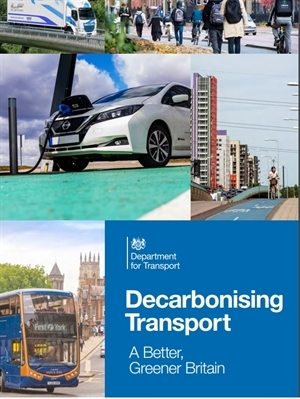UK Government publishes 'world-first' transport decarbonisation plan
Wed 14 July 2021
View all news

The Government has announced the long-awaited plan for decarbonising transport in Britain. The report outlines what the Government says are the key steps needed in six strategic areas for Britain to reach net zero emissions from transport by 2050.
Transport is the UK’s largest source of emissions, responsible for over a quarter of greenhouse gases in 2019. Of this, 55% comes from cars and much of the remainder is from vans and lorries. While the Covid-19 pandemic resulted in reduced travel, emission levels have been returning to pre-pandemic levels.
The key strategic areas or 'pillars' include:
- Accelerating a modal shift to public and active transport.
- The decarbonisation of road vehicles.
- Decarbonising how we get our goods, including a transformation of ‘last-mile’ deliveries.
- Place-based solutions, to consider how and why emissions occur in specific locations.
- Transforming the UK into a hub for green transport technology and innovation.
- Leading international efforts to reduce carbon in a global economy.
With 78 specific ‘commitments’ the plan covers actions needed for the near term including in 2021, all the way through to delivering a fully net zero transport system (including international aviation) by 2050.
As part of the plan, the Government announced the intention to phase out the sale of all non-zero tailpipe emission road vehicles by 2040, subject to consultation. The consultation on the target dates for trucks was launched alongside the plan with motorcycles and coaches to follow later this year.
Another key component of the new strategy is a consultation on a zero-emission vehicle mandate (requiring specific percentages of sales) for carmakers, something that the Committee on Climate Change has previously recommended to support the existing fleet CO2 targets.
However, the plan also acknowledges that technology alone will not be sufficient to achieve net zero, so a focus on active, public and shared transport together with reducing the underlying need to travel, are all key aspects included in the plan.
Responding to the the publication of the Transport Decarbonisation Plan and complementary package of documents and consultations, Andy Eastlake, Zemo Patnership's Chief Executive said: “The clear commitment to move all our road vehicles to zero emissions is critical, but even more important is the appetite to think differently about how this can be delivered.
“Transport is perhaps one of the most emotive and complex areas of our lives and society, but zero tailpipe emission transport technology is already here.
“How we make this the default everywhere while also reducing overall demand for energy and other resources is the real challenge.
“It’s therefore encouraging to see that the plan considers fiscal, behavioural, digital and other policy options as the exciting technology and energy revolutions gather pace. How effectively we can work collaboratively across sectors to bring all these together will be a true test of success of this plan.”
“The Plan is wide-ranging and detailed, encompassing a plethora of approaches and opening a range of questions and consultations about transport decarbonisation.
“Zemo Partnership will be working the widest range of stakeholders to deliver our new 2021 ‘acceleration programme’ of key projects and new initiatives, aligning our activities with the Government’s Plan.”
For further details on Zemo Partnership's response, see this link.
Related Links
< Back to news list